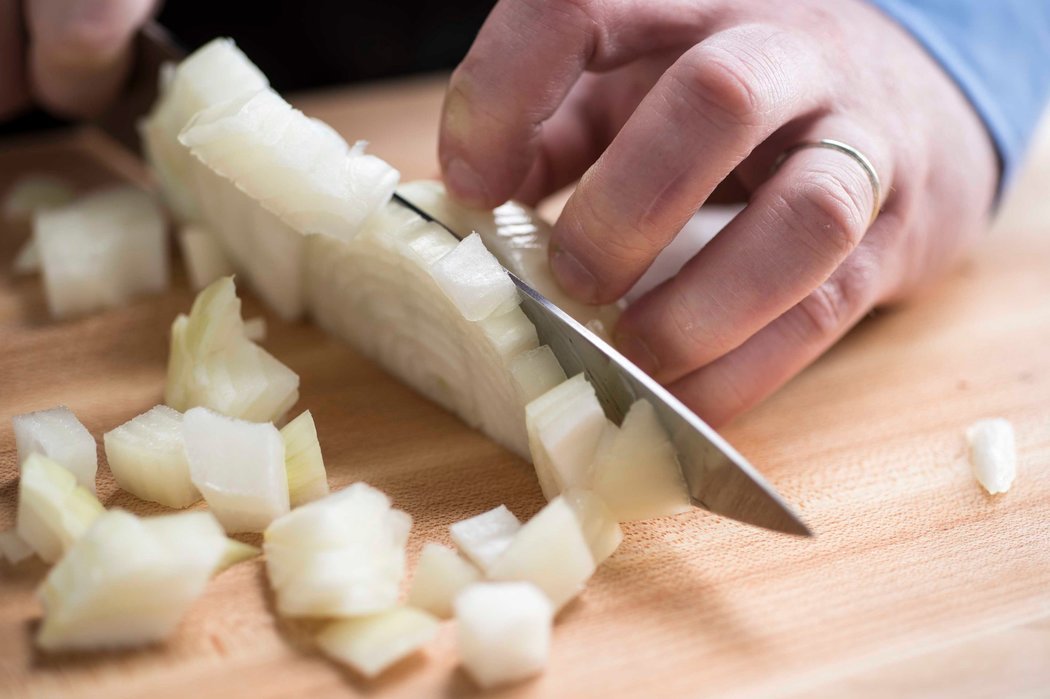|
Trying to figure out why humans cry is exhausting. We cry about death, violence, breakups, abandoned puppies, sweet kisses and words charged with all kinds of meanings. We don’t cry when we should, and we cry for no reason. But let’s take a moment to appreciate the clarity of crying while cutting onions.
弄清人类哭泣的原因是件麻烦事。我们因为死亡、暴力、分手、被遗弃的小狗、甜蜜的吻和饱含各种意思的言语而哭。我们在应该哭的时候不哭,却又会毫无来由地哭起来。不过在这里,我们先好好珍惜一种原因很清楚的哭泣——切洋葱时的流泪。
Onions make us teary because a reaction in the onion releases a chemical called lachrymatory factor, or LF, that irritates our eyes. Simply peeling an onion won’t make your eyes water. But if you chop, cut, crush or smash one — boohoo. The onion’s cells break open, allowing two normally separated substances to combine. Linked together like pieces of a puzzle, they become a potent chemical weapon.
洋葱让我们哭是因为它会释放一种叫催泪因子(lachrymatory factor,简称LF)的化学物质,刺激我们的眼睛。单纯只是剥开一个洋葱并不会让我们流泪。但是如果你去剁、切、捣或压它——呜呜呜。洋葱的细胞会破开,让两种通常分开的物质混合起来。这就像连成了猜字谜里的一个词,它们会成为一种强大的化学武器。
“It turns into a gas. It hits your eyes, and then it hits your sensory nerves in your eyes and causes them to tear up,” said Josie Silvaroli, an undergraduate at Case Western Reserve University in Ohio who helped describe how these pieces fit together, structurally speaking, in a paper published in July in the journal ACS Chemical Biology. “It’s similar to tear gas.”
“它会变成一种气体,冲击你的眼睛,然后冲击眼中的感觉神经,导致流泪,”在俄亥俄州凯斯西储大学(Case Western Reserve University)读本科的乔茜·席尔瓦罗利(Josie Silvaroli)说,她参与的一篇七月发表于《ACS化学生物学》期刊(ACS Chemical Biology)的论文,从结构的角度解释了这些因素的搭配。“和催泪瓦斯差不多。”
Lachrymatory factor evolved as a defense mechanism, protecting onions against microbes and animals like us, even if we’ve learned to bear tears for the sake of flavor. Damaging an onion basically causes it to ramp up its defenses: as cells break, the chemical reaction is unlocked.
催泪因子是作为一种防御机制演化而来的,它能让洋葱抵抗微生物和我们这样的动物的侵袭,尽管我们已经学会为了美味强忍泪水。破坏一个洋葱实际上就是导致它开始防御:随着细胞破裂,化学反应被激活。

切洋葱的时候,两种物质在一个化学反应中结合,释放一种和催泪瓦斯相似的让人流泪的气体。
Inside the intact cells of an onion, a molecule called sulfenic acid precursor floats around the watery filler like a napping human in a lazy river. Also floating in that cytoplasm are little sacs called vacuoles, containing a protein called alliinase, which is like a little drill sergeant of the process.
在一个完好的洋葱细胞内,一种被称为次磺酸前体的分子在填充液里漂着,就像一个躺在漂流河上打瞌睡的人。在细胞质里还漂着一种叫“液泡”的囊,里面装着一种叫蒜酶的蛋白质,它是这个反应过程里的军训教官。
“One has not seen the other, but if you damage the cells, they can now meet and make these reactions,” said Marcin Golczak, a biochemist at Case Western Reserve and principal investigator of the latest study. The molecule and the protein fit together perfectly, the chemical structure of the molecules change, and that lazy floater becomes a smelly soldier armed with tear gas.
“它们本来是不相往来的,但是如果你破坏了细胞,它们就相遇了,开始产生反应,”凯斯西储大学的生物化学家、这项最新研究的首席研究员马尔钦·格尔察克(Marcin Golczak)说。分子和蛋白质是完美契合的,分子的化学结构改变了,慵懒的漂流者成了持有催泪弹的刺鼻战士。
Only two other plants are known to contain LF: guinea hen weed, (Petriveria alliacea) and Sicilian honey garlic (Allium siculum), but you’re far less likely to encounter them. By contrast, the average American eats about 20 pounds of onions a year.
只有另外两种植物含有催泪因子:几内亚母鸡草(Petivera Alliacea)和西西里蜜蒜(Allium siculum),但你不太可能会碰上它们。相比之下,普通美国人每年会吃大约20磅(约合9千克)的洋葱。
That makes for a lot of onion sobbing. And while some people cry more than others, it’s unclear why. It’s also unclear why some varieties seem to be more tolerable than others. Dr. Golczak said potency might depend on freshness, amount of LF produced or even a mutation that would alter LF’s activity.
那意味着大量的洋葱眼泪。尽管有的人哭得比其他人更多,其中原因尚不清楚。同样不清楚的还有,为什么一些品种比另一些让人更容易忍受。格尔察克博士说,洋葱的催泪效力可能取决于它的新鲜程度、产生的催泪因子的数量,甚至一种可以改变催泪因子活动的突变。
But is it possible to avoid the onion feelies?
但是,有可能避免洋葱造成的流泪吗?
In Japan, scientists engineered a tearless onion. But it lacks that signature onion flavor: “The taste is completely different,” Dr. Golczak said.
在日本,科学家们设计出了一种无泪洋葱。但它缺乏那种标志性的洋葱味:“它的味道完全不同,”格尔察克博士说。
With regular onions, there are options: chuck your onion in the fridge before you cut it, or submerge it in water while chopping. Reducing the temperature will slow down the reaction, resulting in less LF. And in water, LF gases will dilute, becoming less potent. These tactics also alter the flavor, by impairing the processes that produce it — similar to what happens with chilled tomatoes.
面对普通的洋葱,有这些选择:在切之前,把你的洋葱放进冰箱,或者在切的时候把洋葱浸入水中。降低温度会放慢洋葱的反应,减少催泪因子的产生。在水中,催泪因子释放的气体会被稀释,降低效力。这些方法通过影响产生洋葱味道的过程,从而改变它的味道——和制作冷冻西红柿的情况类似。
Unfortunately, it seems there’s no simple way to avoid it. For the love of onions, sometimes you just have to cry.
不幸的是,似乎没有简单的方法可以避免为它而流泪。为了对洋葱的爱,有时候你只能哭泣。
本文最初发表于2017年9月5日。
翻译:纽约时报中文网
|
- VOA 英语教学节目
-
- 经典英语在线训练资源
-
|

